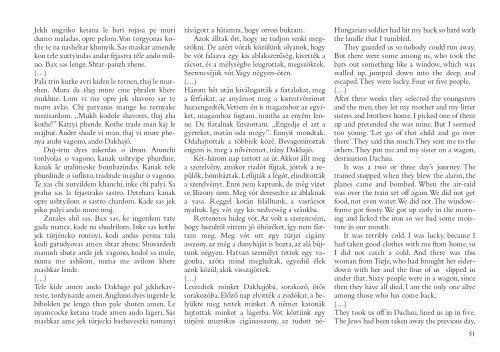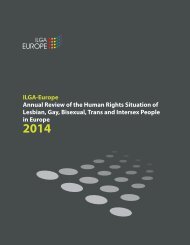Create successful ePaper yourself
Turn your PDF publications into a flip-book with our unique Google optimized e-Paper software.
Jekh ungriko ketana le bari rojasa pe muri<br />
dumo maladas, opre pelom. Von torgyonas ko -<br />
the te na nasheltar khonyik. Sas maskar amende<br />
kon tele xuttyindas andar fejastra téle ando mil -<br />
no. Bax sas lenge. Shtar-panzh zhene.<br />
(…)<br />
Pala trin kurke avri kiden le ternen, thaj le mur -<br />
shen. Mura da thaj mure cine phralen khe re<br />
mukhne. Lom vi me opre jek shavoro sar te<br />
muro avlas. Chi patyanas mange ke ternyake<br />
mezisardom. „Mukh kodole shavores, thaj zha<br />
kothe!” Kattyi phende. Kothe trade man kaj le<br />
majbut. Andre shude vi man, thaj vi mure phe -<br />
nya ando vagono, ando Dakhajó.<br />
Duj-trin dyes inkerdas o drom. Atunchi<br />
tordyolas o vagono, kanak ushtyipe phurdine,<br />
kanak le uralimeske bombazindas. Kanak tele<br />
phurdinde o suflisto, tradinde majdur o vago no.<br />
Te xas chi xutyildem khanchi, inke chi pa lyi. Sa<br />
praho sas la fejastrako sastro. Detehara kanak<br />
opre ushtyilom o sastro chardom. Kade sas jek<br />
piko palyi ando muro muj.<br />
Zurales shil sas. Bax sas, ke ingerdem tate<br />
gada manca, kade na shudrilom. Inke sas kothe<br />
jek türjéncko romnyi, kodi andas perina tala<br />
kodi garudyovas amen shtar zhene. Shovardesh<br />
manush shute anda jek vagono, kodol sa mule,<br />
numa me ashilom, numa me avilom khere<br />
mashkar lende.<br />
(…)<br />
Tele kide amen ando Dakhajo pal jekhe kav -<br />
reste, tordyisarde amen. Angluno dyes ingerde le<br />
bibolden pe lengo than pale shuten amen. Le<br />
nyamcocke ketana trade amen ando lageri. Sas<br />
mashkar ame jek türjecki bashaveszki romanyi<br />
rávágott a hátamra, hogy orron buktam.<br />
Azok álltak ôrt, hogy ne tudjon senki meg -<br />
szökni. De azért vótak közülünk olyanok, hogy<br />
be vót falazva egy kis ablakszerûség, kivették a<br />
rácsot, és a mélységbe leugrottak, meg szöktek.<br />
Szerencséjük vót. Vagy négyen-öten.<br />
(…)<br />
Három hét után kiválogatták a fiatalokat, meg<br />
a férfiakat, az anyámot meg a kistestvéreimet<br />
hazaengedték. Vettem én is magamhoz az egyi -<br />
ket, magamhoz fogtam, mintha az enyém len -<br />
ne. De fiatalnak látszottam. „Engedje el azt a<br />
gyereket, osztán oda megy”. Ennyit mondtak.<br />
Odahajtottak a többiek közé. Bevagoníroztak<br />
engem is, meg a nôvéremet, irány Dakhajó.<br />
Két-három nap tartott az út. Akkor állt meg<br />
a szerelvény, amikor riadót fújtak, jöttek a re -<br />
pülôk, bombáztak. Lefújták a légót, elindították<br />
a szerelvényt. Enni nem kaptunk, de még vizet<br />
se. Bizony nem. Meg vót deresedve az ab laknak<br />
a vasa. Reggel korán felálltunk, a vasrácsot<br />
nyaltuk. Így vót egy kis nedvesség a szánk ba.<br />
Rettenetes hideg vót. Az volt a szerencsém,<br />
hogy hazulról vittem jó öltözéket, így nem fáztam<br />
meg. Meg vót ott egy türjei cigány<br />
asszony, az még a dunyháját is hozta, az alá bújtunk<br />
négyen. Hatvan személyt tettek egy va -<br />
gonba, azóta mind meghaltak, egyedül élek<br />
azok közül, akik visszajöttek.<br />
(…)<br />
Leszedtek minket Dakhajóba, sorakozó, ötös<br />
sorakozóba. Elôzô nap elvitték a zsidókat, a he -<br />
lyükre meg tettek minket. A német katonák<br />
haj tottak minket a lágerba. Vót köztünk egy<br />
türjéni muzsikus cigánasszony, az tudott né -<br />
Hungarian soldier had hit my back so hard with<br />
the landle that I tumbled.<br />
They guarded us so nobody could run away.<br />
But there were some among us, who took the<br />
bars out something like a window, which was<br />
walled up, jumped down into the deep, and<br />
escaped. They were lucky. Four or five people.<br />
(…)<br />
After three weeks they selected the youngsters<br />
and the men, they let my mother and my litter<br />
sisters and brothers home. I picked one of them<br />
up and pretended she was mine. But I seemed<br />
too young. ‘Let go of that child and go over<br />
there’. They said this much. They sent me to the<br />
others. They put me and my sister on a wagon,<br />
destination Dachau.<br />
It was a two or three day’s journey. The<br />
trained stopped when they blew the alarm, the<br />
planes came and bombed. When the air-raid<br />
was over the train set off again. We did not get<br />
food, not even water. We did not. The windowframe<br />
got frosty. We got up early in the morning<br />
and licked the iron so we had some moisture<br />
in our mouth.<br />
It was terribly cold. I was lucky, because I<br />
had taken good clothes with me from home, so<br />
I did not catch a cold. And there was this<br />
woman from Türje, who had brought her eiderdown<br />
with her and the four of us slipped in<br />
under that. Sixty people were in a wagon, since<br />
then they have all died, I am the only one alive<br />
among those who has come back.<br />
(…)<br />
They took us off in Dachau, lined us up in five.<br />
The Jews had been taken away the previous day,<br />
51



